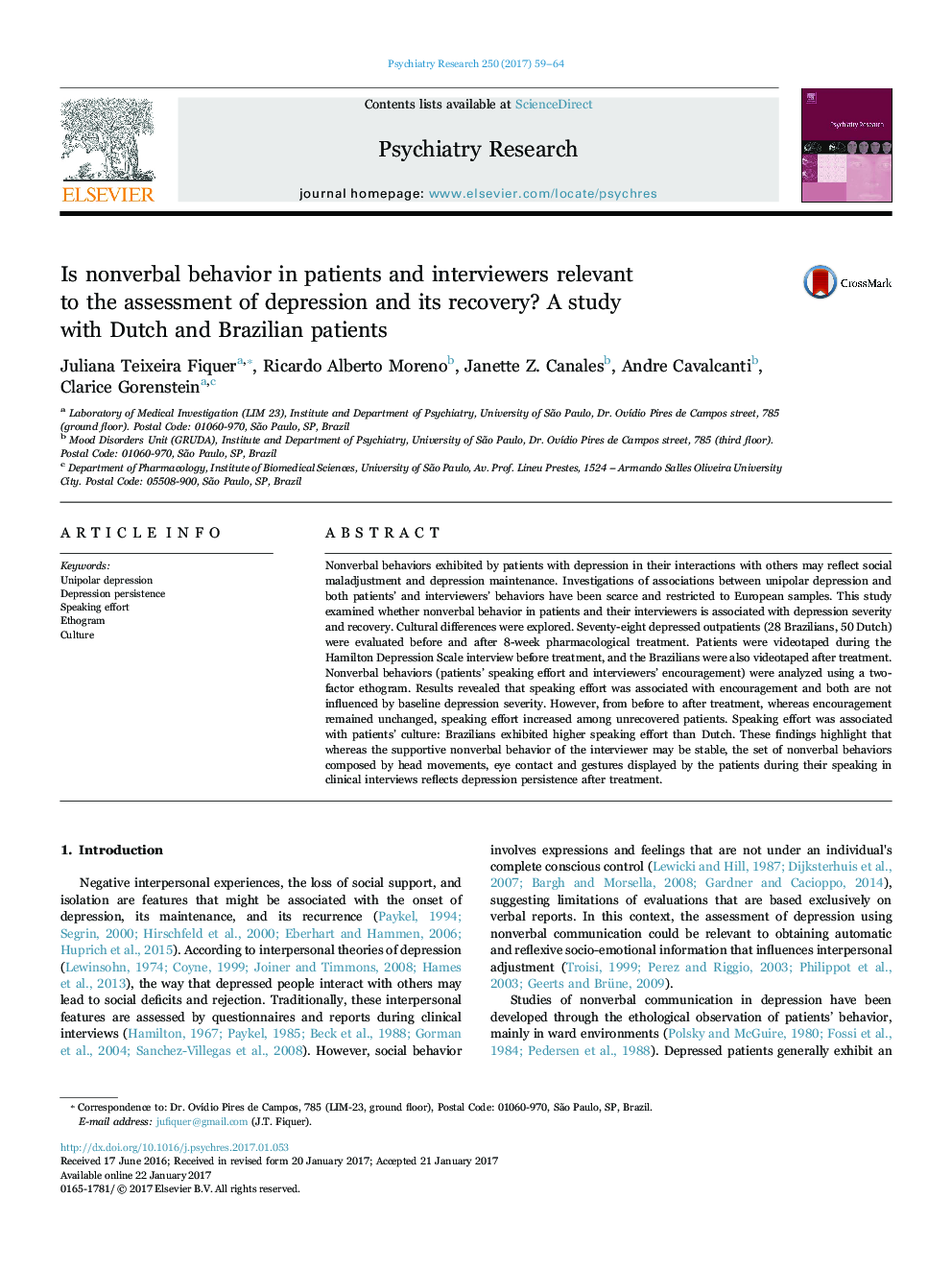| کد مقاله | کد نشریه | سال انتشار | مقاله انگلیسی | نسخه تمام متن |
|---|---|---|---|---|
| 4933336 | 1433796 | 2017 | 6 صفحه PDF | دانلود رایگان |
عنوان انگلیسی مقاله ISI
Is nonverbal behavior in patients and interviewers relevant to the assessment of depression and its recovery? A study with Dutch and Brazilian patients
ترجمه فارسی عنوان
آیا رفتار غیر کلامی در بیماران و مصاحبه کنندگان مربوط به ارزیابی افسردگی و بهبودی آن است؟ یک مطالعه با بیماران هلندی و برزیلی
دانلود مقاله + سفارش ترجمه
دانلود مقاله ISI انگلیسی
رایگان برای ایرانیان
ترجمه چکیده
رفتار غیر کلامی که توسط بیماران مبتلا به افسردگی در تعاملات آنها با دیگران نشان داده می شود ممکن است منجر به نابسامانی اجتماعی و حفظ افسردگی شود. بررسی ارتباط بین افسردگی یکپارچه و رفتار هر دو بیمار و مصاحبه شونده، کمیاب بوده و محدود به نمونه های اروپایی است. این مطالعه به بررسی اینکه آیا رفتار غیر کلامی در بیماران و مصاحبه شونده ها با شدت افسردگی و بهبودی همراه است یا خیر. تفاوت های فرهنگی مورد بررسی قرار گرفت. هفتاد و هشت بیمار مبتلا به افسردگی (28 برزیلی، 50 هلندی) قبل و بعد از 8 هفته درمان دارویی مورد ارزیابی قرار گرفتند. بیماران در مصاحبه مقیاس افسردگی همیلتون فیلمبرداری را قبل از درمان ضبط کردند و برزیلی نیز پس از درمان فیلم برداری شد. رفتارهای غیروابسته (تلاش زبان گفتاری بیماران و تشویق مصاحبه گران) با استفاده از یک اخطار دو عامل انجام شد. نتایج نشان داد که تلاش زبان با تشویق همراه بوده و هر دو تحت تاثیر شدت افسردگی پایه قرار نگرفته اند. با این حال، از قبل تا پس از درمان، در حالی که تشویق باقی ماند بدون تغییر، تلاش صحبت کردن در میان بیماران غیر باز نشده افزایش یافته است. تلاش های سخنرانی با فرهنگ بیماران همراه بود: برزیل ها بیشتر از زبان هلندی سخن می گفتند. این یافته ها نشان می دهد که در حالی که رفتار غیروانه حمایت کننده مصاحبه کننده ممکن است پایدار باشد، مجموعه ای از رفتارهای غیر کلامی که از طریق حرکات سر، تماس با چشم و حرکات نشان داده شده توسط بیماران در هنگام صحبت در مصاحبه های بالینی نشان دهنده پایداری افسردگی پس از درمان است.
موضوعات مرتبط
علوم زیستی و بیوفناوری
علم عصب شناسی
روانپزشکی بیولوژیکی
چکیده انگلیسی
Nonverbal behaviors exhibited by patients with depression in their interactions with others may reflect social maladjustment and depression maintenance. Investigations of associations between unipolar depression and both patients' and interviewers' behaviors have been scarce and restricted to European samples. This study examined whether nonverbal behavior in patients and their interviewers is associated with depression severity and recovery. Cultural differences were explored. Seventy-eight depressed outpatients (28 Brazilians, 50 Dutch) were evaluated before and after 8-week pharmacological treatment. Patients were videotaped during the Hamilton Depression Scale interview before treatment, and the Brazilians were also videotaped after treatment. Nonverbal behaviors (patients' speaking effort and interviewers' encouragement) were analyzed using a two-factor ethogram. Results revealed that speaking effort was associated with encouragement and both are not influenced by baseline depression severity. However, from before to after treatment, whereas encouragement remained unchanged, speaking effort increased among unrecovered patients. Speaking effort was associated with patients' culture: Brazilians exhibited higher speaking effort than Dutch. These findings highlight that whereas the supportive nonverbal behavior of the interviewer may be stable, the set of nonverbal behaviors composed by head movements, eye contact and gestures displayed by the patients during their speaking in clinical interviews reflects depression persistence after treatment.
ناشر
Database: Elsevier - ScienceDirect (ساینس دایرکت)
Journal: Psychiatry Research - Volume 250, April 2017, Pages 59-64
Journal: Psychiatry Research - Volume 250, April 2017, Pages 59-64
نویسندگان
Juliana Teixeira Fiquer, Ricardo Alberto Moreno, Janette Z. Canales, Andre Cavalcanti, Clarice Gorenstein,
